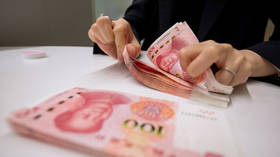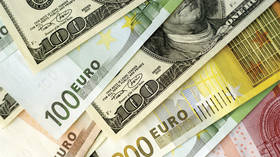
Moscow will reportedly begin buying foreign currency as early as this month to bolster reserves

© Getty Images / Bloomberg Creative
Russia could restart purchases of foreign currency for its reserves in May as growing energy revenues “stabilize” public finances despite Western efforts to damage the country’s economy, Bloomberg reported on Tuesday.
The Finance Ministry is due to announce the resumption of foreign exchange purchases later this week, the outlet said. Initial volumes are expected to be equivalent to about $200 million in yuan per month. The Chinese currency is viewed as the main asset Russia can use for transactions to refill its $154 billion national wealth fund.
“It will be important for the market that the state is starting to accumulate reserves again instead of spending them,” said Natalia Milchakova, an analyst at Freedom Holding Corp. “This may even positively affect the ruble,” she added.
Russia halted foreign exchange purchases in late January 2022 and further suspended the program following the outbreak of the conflict in Ukraine. At the beginning of this year, the Bank of Russia resumed operations with foreign currency amid soaring oil and gas revenues. The move was part of a revamped budgetary mechanism designed to shield the economy from the volatility of commodity markets, and transactions are now carried out in yuan.

Moscow has slashed yuan sales over the past two months to cover the budget deficit, with sales halving in April compared to February.
The volumes of foreign exchange purchases will initially be small but will still be “highly symbolic” as they will show that Russia is building reserves rather than “eating through” them, according to Bloomberg’s Russia economist, Alexander Isakov.
The shift from selling to buying would highlight “Russia’s ability to keep up the flow of petrodollars in the face of sanctions and the price cap” imposed by the EU, G7, and their allies, the outlet claimed.
Despite an “unprecedented deficit” which amounted to 2.4 trillion rubles ($29.8 billion) by the end of the first quarter, the Russian federal budget “is on the mend” partly due to changes in the calculations of some oil taxes, Bloomberg reported.
For more stories on economy & finance visit RT’s business section




